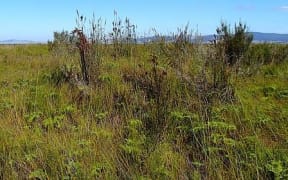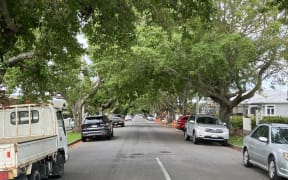
NZ is is unique in allowing unlimited tree planting to meet its climate goals, says a new report. File photo. Photo: 123RF
Fears that New Zealand is relying too heavily on low-cost forests to absorb its carbon dioxide emissions have been reignited by a report from the OECD.
The OECD's economic survey says this country is unique in allowing unlimited tree planting to meet its climate goals, instead of slowing emissions.
The report echoes a warning from the Climate Change Commission that under current policies, companies may have no incentive to address the root cause of the climate change.
The Emissions Trading Scheme (ETS) is New Zealand's main tool for fighting climate change.
Companies burning fossil fuels for fuel, power and heavy industry have to pay for their emissions by buying units, and often the units they buy come from planting trees.
The system is meant to give companies an incentive to cut their planet-heating gases, as well as getting more trees in the ground.
But planting fast-growing pine trees to generate units currently looks set to be cheaper than actually cutting greenhouse gases, with enough credits from forestry projected to be available in the 2030s to cover every carbon-producing sector in the scheme.
The OECD report - echoing the Climate Change Commission before it - said this was risky because trees were not permanent and it could create a boom and bust cycle in the carbon market.
One issue highlighted was that farming, along with big carbon emitters who export their products, were largely shielded from having to buy units in the ETS. That meant the ETS covered less than half New Zealand's emissions - lowering demand - but all the country's forestry land was available to offset them - raising supply - keeping the carbon price lower.
Current strategy makes no sense - campaigner
The National-led government was clearly aware of the issue, said 350 Aotearoa climate campaigner Adam Currie, who obtained a briefing from climate minister Simon Watts to Christopher Luxon.
The briefing said that without changes, the ETS would meet New Zealand's climate targets primarily by planting more pine trees with less action on transport and industry emissions. It said the issue needed "careful consideration."
Currie said the current strategy made no sense, because it ignored the underlying problem of fossil fuels and created problems for rural communities from forestry slash and other issues from pine conversions.
Many farmers blamed the ETS for driving farmland conversions to forestry, and wanted tougher government limits on pine.
But foresters were understandably less keen on new limits.
Elizabeth Heeg of the Forest Owners Association said forests' role in lowering carbon prices had been "overcooked".
She said the bigger problem was the government creating oversupply, by giving away too many units to big emitters to protect their export competitiveness - another issue raised by the OECD and climate commission.
She also said the forest cover of New Zealand was still lower than it was when the ETS was introduced, which sparked a wave of deforestation by forests owners who did not want to be caught by the scheme.
But Heeg said foresters wanted a resolution.
She said all the flip-flopping over policies was hurting the carbon market.
Volatile market
A climate commission graph from earlier this year showed the carbon price spiking and crashing in response to various policy announcements, showing how volatile the market has been in response to political changes.
But addressing the issue of forestry has not been easy for previous governments.
Lizzie Chambers of carbon trading platform Carbon Match remembered how, under Labour, the carbon market crashed on news of a sweeping review of forestry's role.
"It sent shivers through every market participant," she said.
National axed the review, and the carbon price partially recovered, but Chambers said uncertainty persisted because it ha not addressed the problem.
The OECD was now saying it was time to end the ongoing speculation.
Simpson Grierson ETS specialist Joanna Lim said National needed to consult carefully, because any "unformed ideas" floating around without adequate consultation could destabilise the industry again.
Complicating the conundrum for the government, was the fact it planned to use the ETS as the main means to cut emissions, rejecting carbon-cutting subsidies, which it calls "corporate welfare".
But it will also be aware that means higher carbon prices, which may raise living costs.
As for National's plan, Watts has said the government will bring in rules - outside the ETS - restricting what land that can be planted in trees, but he was not ready to talk about these.








